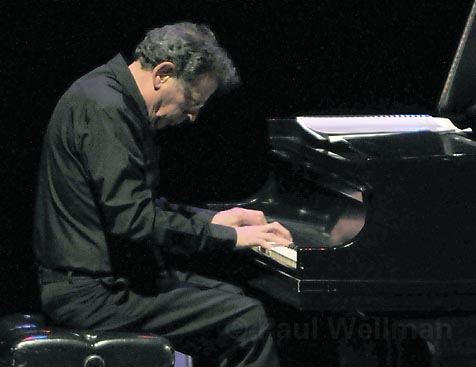Philip Glass: An Evening of Chamber Music
Presented by UCSB Arts & Lectures at UCSB's Campbell Hall. Sunday, March 2.

With Philip Glass’s music, it’s hard to predict what’s coming next, let alone where it will end. When Glass stepped onto the stage Sunday evening, he announced cheerfully that the program he was about to present was neither the one printed in the program nor that which was printed in the insert.
First came Mad Rush, originally written for the pipe organ on the occasion of the Dalai Lama’s first visit to New York in 1979. In order to accommodate the uncertain arrival time of his holiness, the piece had to be of indefinite length, “which of course,” Glass quipped, “was not a problem.” Glass played from memory, head bowed, fingers rippling over fluid arpeggios and rising through the utterly simple chord progressions that are his trademark. Mad Rush was a torrent, then a trickling stream, clear currents followed by muddy churnings. It ended abruptly, as if, like a river, it had dropped underground. Wendy Sutter took the stage for Songs and Poems for Cello, a work in seven movements. “You’ll know when it’s over,” Glass promised, yet the audience was fooled more than once. Songs and Poems was composed for Sutter, and she played it like she owned it. What would have been theme and variation in a Baroque world became variations on variations that pushed the instrument to the edge of its range before returning to a familiar melodic refrain.
Sutter and Glass were joined by percussionist Mick Rossi for the greatest thrill of the evening: “Tissues”-four interludes from the film Noqoyqatsi. “Tissue” number one opens on a high, haunting note, the bow screeching across the cello’s strings. Soft rolls of the cymbals, a low gong, and the piano hover just beneath as the cello’s notes rise to a ghostly shimmer, then to beehive frenetics. All three remained onstage for The Orchard, an entrancing work in which Rossi introduced everything from maracas to a hand drum to a string of bells, and for “Closing,” the spellbinding and deeply familiar score from 1981’s Glassworks on CBS Records. But in true Glass style, “Closing” didn’t mark the end; back they came for an encore.



